82 Search Results for motivation
March 3, 2014
by Carole Zangari -
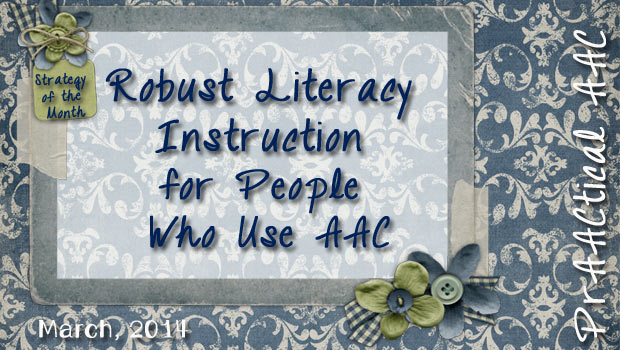
We get so many questions about the best way to ‘do’ literacy with AAC learners that decided to build on the earlier posts from and talk more about the ways in which we can support the development of reading and writing skills. For AAC learners, the most important skill set (after communication) is the ability to read and write. When given the chance, we’d teach literacy before almost anything else. Why? First, because it opens the door to so many things. When someone can read and write they are more likely to be successful with academics, find jobs and develop real careers, and enjoy productive leisure time. Secondly, we find that it changes people’s perceptions of an AAC learner. When they see Billy writing or reading with comprehension, they understand that his severely limited speech does not reflect his intellect, motivation, or potential. It shapes their perception of him to... [Read More...]
January 13, 2014
by Robin Parker -
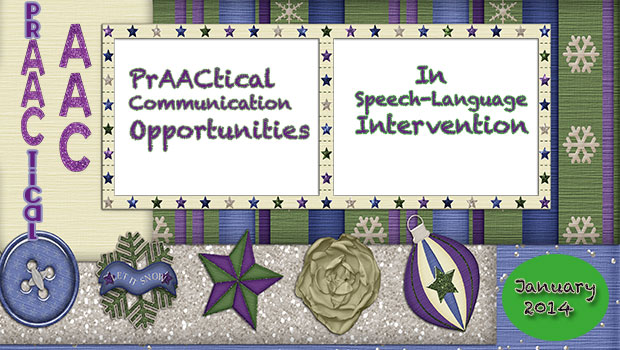
Planning for communication opportunities in every aspect of speech-language therapy helps ensure productive use of time and effort for both clinician and learner. It is not enough to talk to a student, it is not enough to provide fun activities without lots of opportunity for active participation and more specifically communication initiation. Another word for communication initiation/opportunities is communication temptations. Communication temptations are structured situations designed to entice a variety of specific communication functions or semantic relations (Wetherby, 1988). There needs to be lots of times where there is targeted modeling and then a specific, obvious reason for the learner to be the initiator of communication. A temptation to communicate. Take a look at this sample therapy session for frequent and multiple communication opportunities. Please let us know a favorite or creative communication opportunity that you use. PrAACtical Considerations Meaningful AAC Goals– All quality speech-language intervention sessions start with meaningful... [Read More...]
December 4, 2013
by Carole Zangari -
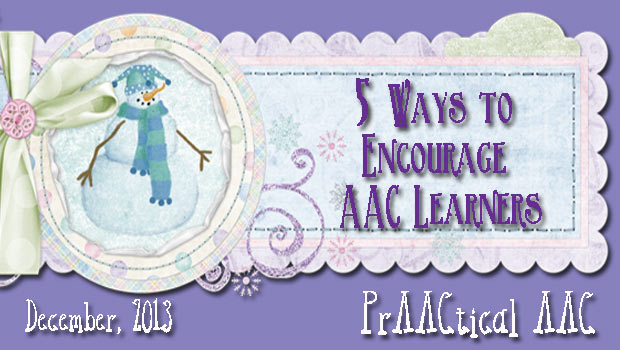
As clinical educators, we have lots of conversations with student SLPs about reinforcement of specific skills. We’ll save that for another post, but today we want to put reinforcement into a large context. We all learn best in an environment in which we are accepted and encouraged. It’s often hard to ‘see’ how to do that in a therapy session where the AAC learner has so many skill deficits, particularly if you are starting out in your AAC career. Here are some ideas. Accept their responses without judgment.The Dot (click on image) is a great reminder to us all of how our responses to a learner’s attempt can make ALL the difference in how they see themselves. Use the language of communication. Instead of ‘show me on your board’ or ‘point to what you want,’ use communication-oriented verbs, like ‘tell’ or ‘say.’ “Tell me what you’re thinking.” “I like what... [Read More...]
September 10, 2013
by Carole Zangari -
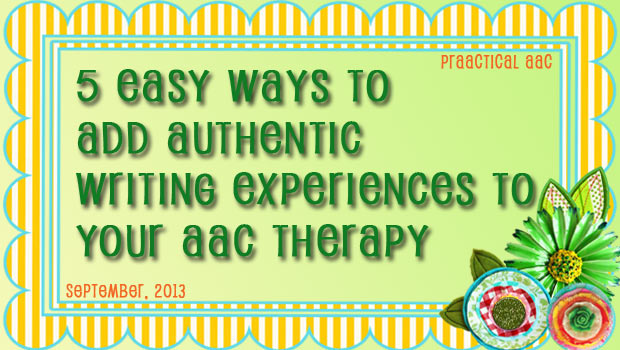
There is no substitute for systematic instruction in reading and writing for building specific skills. AAC learners need high-quality instruction and lots of it. Beyond that, though, there are many ways to infuse literacy practice into the regular routine in therapy and at home. Writing for authentic purposes refers to experiences that reflect the writing activities of people in their regular lives. Authentic writing builds fluency, promotes skill generalization, and helps to build one’s self-concept as a writer. Plus, it’s fun, motivating, and pretty easy to do. Here are some things we try to do to include authentic writing experiences into our AAC therapies. 1. Sign in and out of the therapy session or classroom: Every AAC learner can do this. If the traditional sign-in form then doesn’t cut it, then make up a special sheet that has the client’s name in traceable letters, a name stamp, or placing a... [Read More...]
August 23, 2013
by Robin Parker -
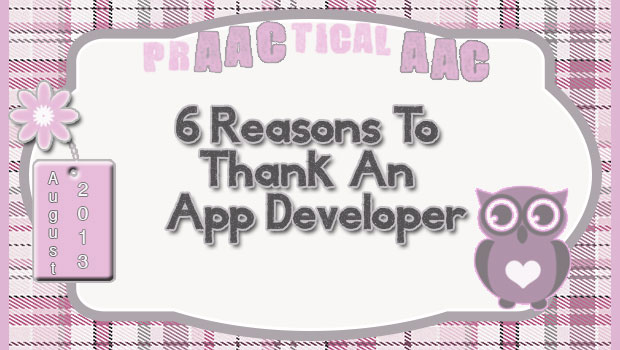
As you know, we love combining apps in intervention as one tool for engaging learners in meaningful language activities. Apps can also be used within home prAACtice and ‘waiting time’ recommendations. Some of the apps we use and recommend are made for general as well as special education while others are just everyday apps developed to make life easier. When we use the apps for communication and language there are some features that help many of our students. Additionally, there are updates and other things that really help educators. This is just a beginning list of app features we love (feel free to write with more). THANKYOU APP DEVELOPERS FOR: Listening to feedback- we have emailed many app developers with ‘feedback’ and have always received responses and often that feedback is incorporated into updates to the app. Building in choice making opportunities- We love apps that require active participation on the part... [Read More...]
May 24, 2013
by Carole Zangari -
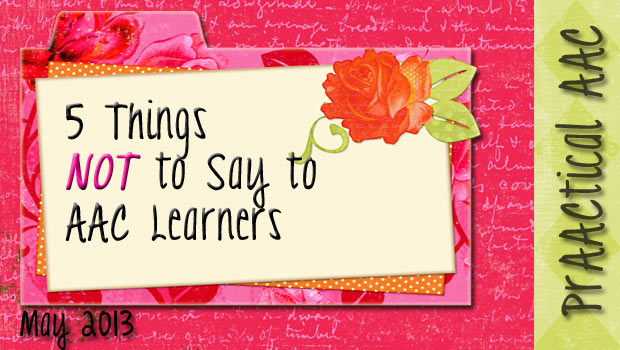
People who are learning to express themselves with AAC need to build their self-concept as competent communicators. One of the ways we can support that process is by being careful about the ways in which we refer to their communication. Here are a few things we try to avoid saying. “Show me [on your device].” (Instead, build the language of communication, with directives such as “Tell me” or “Say it.”) “Press the switch.” (Instead, refer to the function that the switch is being used for. E.g., “Make it go”) See Ian Bean’s great post on this subject. “Tell me on your talker.” (If they tell you one way, and you understood the message…celebrate, reward, and encourage! If you make them repeat themselves using a different strategy, they may come to view communication using AAC as a chore. And that’s not so good for motivation…) “I know you can do it.... [Read More...]
April 25, 2013
by Carole Zangari -
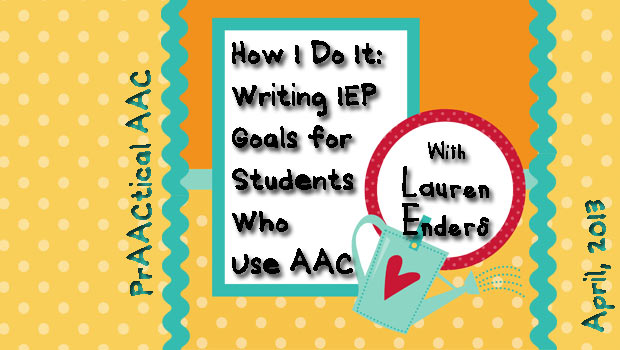
We’re so happy to welcome Lauren Enders back to share some more thoughts on AAC and the IEP. In her first post on this topic, Lauren addressed some frequently asked questions. Today, she provides a very valuable perspective on writing IEP goals for students who use or need AAC and some wonderful resources. Very often, I receive requests for support from teachers and speech therapists that are writing IEP goals for their students who use AAC. When we sit down to discuss their questions, the first thing I remind them is that AAC goals are no different from any other IEP goal. I recall a workshop I attended years ago presented by Gail VanTatenhove that helps put IEP goals for AAC into perspective. Gail said that AAC therapy is just language therapy. Isn’t that true? Aren’t we just teaching language? For this student, language is simply being expressed in a... [Read More...]
April 4, 2013
by Carole Zangari -
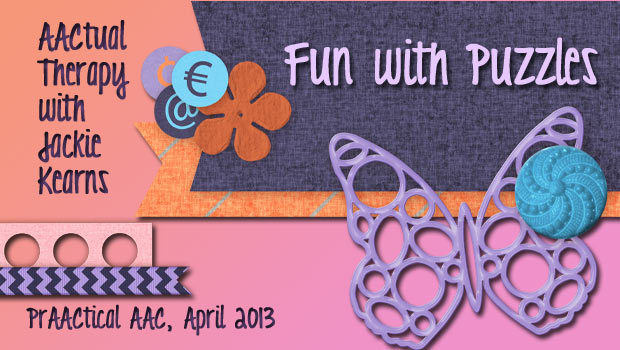
Today, we’re pleased to introduce SLP Jackie Kearns, coordinator of the Technology Resource Center at the Cleveland Clinic Children’s Hospital for Rehabilitation. Prior to that, she received her bachelor’s and master’s degrees from Ohio University. She completed both an undergraduate and graduate level thesis and has published in Contemporary Issues in Communication Sciences and Disorders. Jackie has over 5 years’ experience working with medically complex children in both inpatient and outpatient hospital settings. She has provided numerous AAC evaluations and treatment for children ranging from 1-21 years of age. In addition, she has done numerous presentations and in-services for staff at the Cleveland Clinic. We’re grateful to Jackie’s AAC professor and mentor, Dr. John McCarthy for recommending her to us. Therapy Activity: Fun with Puzzles Intended audience: Early intervention, preschool aged children, and/or emergent AAC communicators Type(s) of AAC: Eye gaze, reaching Picture communication symbols Single message voice output communication... [Read More...]
February 14, 2013
by Carole Zangari -
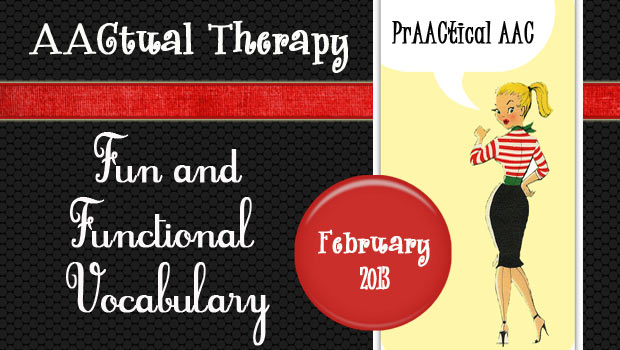
We are delighted to have Shareka Bentham back to share another post about the AACtual therapy she provides to little ones in Barbados. Last month, we followed her along to the zoo where her little friends got to generalize the language skills developed in therapy sessions. In this post, Shareka discusses her approach to something we all struggle with: selecting vocabulary that will both fun and functional. One of my biggest challenges in AAC is choosing good vocabulary targets, and working on vocabulary instruction for early communicators. By ‘good’ I mean targets which are functional for their everyday settings, representative, and most of all fun for children who are not only beginning communicators, but also beginning AAC users. I have become the AAC ‘specialist’ at a school for children with complex communication needs, so I generally have to cater to the communicative needs of children from the pre-communication to... [Read More...]
January 19, 2013
by Robin Parker -
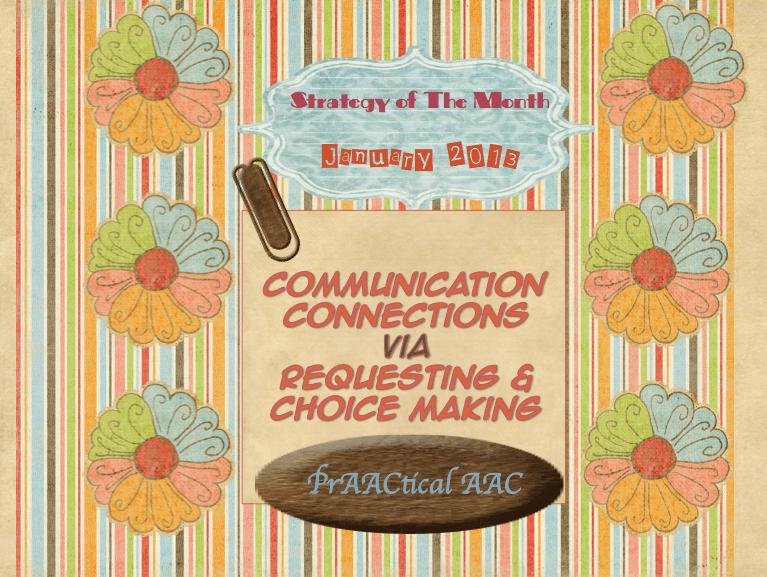
The January Strategy of the Month has focused on requesting and choice making. These are really fun goals to implement. They fall under the communication function that helps us meet our own needs (Behavioral Regulation). When we get what we want, there is a sense of control over the environment & we increase symbolic communication/language, and self-sufficiency. It’s all good. The assumption for all requests and choices is that the learner ‘likes’ what they have asked for. This is what makes the process so much fun, we get to do activities and have interactions that are positive and motivating. If only it was that easy… Sometimes it is not… But do not worry…there are plenty of solutions for common (and not so common) problems when teaching requesting and choice making. As always, set the stage for a positive TEACHING paradigm and then move to problem solving if necessary (and when it is... [Read More...]









